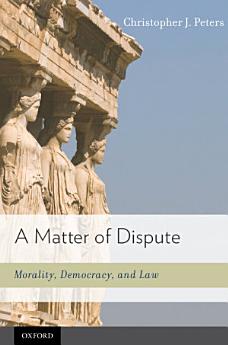A Matter of Dispute: Morality, Democracy, and Law
Christopher J. Peters
Jan 2011 · Oxford University Press
Ebook
378
Pages
family_home
Eligible
info
reportRatings and reviews aren’t verified Learn More
About this ebook
Law often purports to require people, including government officials, to act in ways they think are morally wrong or harmful. What is it about law that can justify such a claim? In A Matter of Dispute: Morality, Democracy, and Law, Christopher J. Peters offers an answer to this question, one that illuminates the unique appeal of democratic government, the peculiar structure of adversary adjudication, and the contested legitimacy of constitutional judicial review. Peters contends that law should be viewed primarily as a device for avoiding or resolving disputes, a function that implies certain core properties of authoritative legal procedures. Those properties - competence and impartiality - give democracy its advantage over other forms of government. They also underwrite the adversary nature of common-law adjudication and the duties and constraints of democratic judges. And they ground a defense of constitutionalism and judicial review against persistent objections that those practices are "counter-majoritarian" and thus nondemocratic. This work canvasses fundamental problems within the diverse disciplines of legal philosophy, democratic theory, philosophy of adjudication, and public-law theory and suggests a unified approach to unraveling them. It also addresses practical questions of law and government in a way that should appeal to anyone interested in the complex and often troubled relationship among morality, democracy, and the rule of law. Written for specialists and non-specialists alike, A Matter of Dispute explains why each of us individually, and all of us collectively, have reason to obey the law - why democracy truly is a system of government under law.
About the author
Christopher J. Peters is a Professor of Law at the University of Baltimore where he teaches constitutional law, constitutional theory, and civil procedure. He also has taught at the law schools of the University of Chicago, Loyola Marymount University, the University of Michigan, the University of Toledo, and Wayne State University. His articles have appeared in many legal journals, including the Harvard Law Review, the Yale Law Journal, the Columbia Law Review, and Legal Theory. Born and raised in Michigan, he now lives in Baltimore with his wife, who is a librarian and researcher. This is his first book.
Rate this ebook
Tell us what you think.
Reading information
Smartphones and tablets
Install the Google Play Books app for Android and iPad/iPhone. It syncs automatically with your account and allows you to read online or offline wherever you are.
Laptops and computers
You can listen to audiobooks purchased on Google Play using your computer's web browser.
eReaders and other devices
To read on e-ink devices like Kobo eReaders, you'll need to download a file and transfer it to your device. Follow the detailed Help Center instructions to transfer the files to supported eReaders.




